Rawhide is a popular pet chew item likely found in owners’ homes across the country. Not only can it help keep your pup entertained and out of trouble but chewing on it can promote healthy teeth and gums and remove plaque buildup that leads to decay.
So How can you Soften Rawhide for your Dog?
You can soften rawhide bones for your Dog by soaking them in warm water, boiling them in broth, or putting it in a microwave oven on low heat for 5 minutes.
Read this comprehensive guide about rawhide for dogs and make things easy for you and your furry friend.
Are Rawhide bones safe for dogs?
There are different opinions of pet experts regarding rawhide chews for dogs. Some consider the treatment safe for canines, while many discourage giving the treat to your pup due to its potential side effects.
Rawhides are not toxic for dogs; however, some safety concerns are associated with the treat, such as intestinal blockage, choking hazards, and other chemicals and minerals in the rawhide bone.
If your pup likes to chew the treat, make sure to soften it and keep a close eye on your pet. We suggest using a safe alternative.
How to Soften rawhide For Dogs?
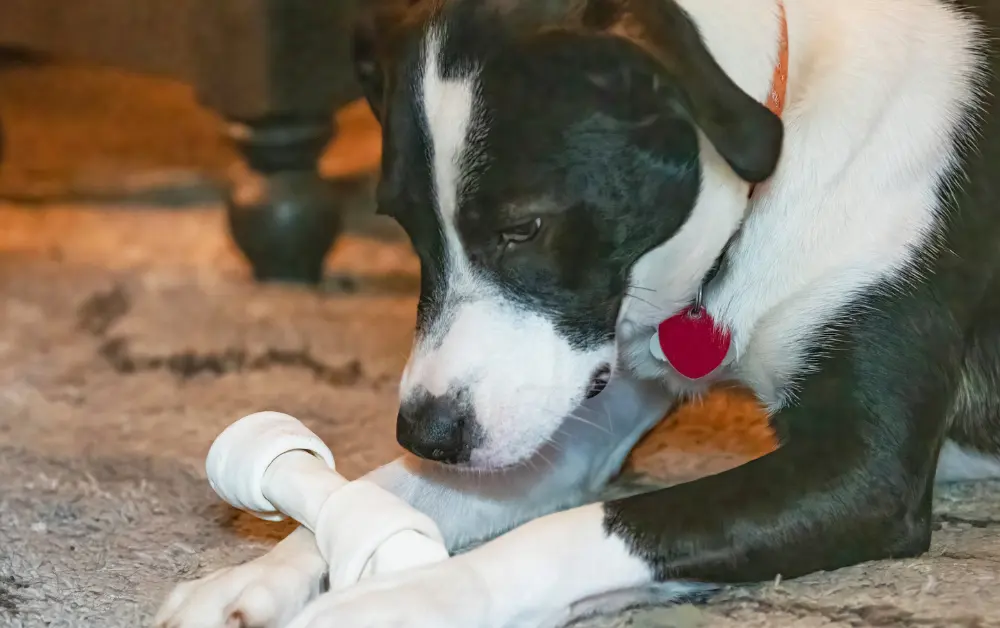
Preparing rawhide for your pup can be a great way to give them a safe, long-lasting chew toy. By following the few simple steps below, you can soften the chew treat for your pet.
1) Soak the rawhide in warm water
Soaking rawhide in warm water is a great way to make this popular treat fun and safe for your pup. The water will soften the chew, which makes it easier for the puppy to chew.
It’s also safer because it prevents choking hazards that could happen with larger chunks.
Not only will your pup be able to digest the pieces quicker, but they’ll probably enjoy it more.
2) Boil in Broth
Soaking rawhide in chicken broth can be a great way to give your dog a savory, healthy treat. Put the treat in a boiling broth for 1-2 minutes, and then serve it to your pet when it cools.
This makes it easier for your pup to chew on and adds extra flavor and protein.
Do not add toxic ingredients to the broth, such as onion, garlic, or other additives.
3) Punt on Low heat in the microwave Oven
Take a high-quality rawhide and wrap it in a clean cloth or aluminum foil. Now Put it in the microwave on low heat for five minutes.
After being put at this low temperature, the rawhide will be softer and more pliable than originally purchased.
4) Rub with warm vegetable oil
Rub a small amount of warm and safe vegetable oil onto the chewy treat to make it softer.
Not only does this make it easier for your pup’s teeth to sink into and chew, but it also reduces their chances of developing an upset stomach due to swallowing large indigestible hunks.
Softening rawhide treats with warm vegetable oil ensures that your puppy gets nutrition inside of them to ensure they remain healthy and happy.
4) Use white vinegar
Softening your pet’s rawhide treats is a great way to ensure they have safe chew toys. White vinegar is an excellent solution for this, as it has natural antibacterial properties and can be safely consumed by pets.
All you need to do is soak the treat in white vinegar for one minute, then rinse it with warm water.
Just be sure to rinse off afterward and ensure no residue is left on the treat.
Do not give the vinegar to your puppy.
What are the benefits of Rawhides bones for dogs?
- Promotes dental health: Rawhides help keep teeth and gums healthy by providing natural chewing action to remove food particles and plaque build-up between teeth.
- Prevents boredom: Chewing on a rawhide is an excellent way to keep your pet occupied when you’re away or busy, so they don’t get bored and destructive.
- Relieves anxiety: Chewing can help relieve stress and anxiety in canines, distracting them from negative emotions and allowing them to focus their energy positively.
- Help in teething pain: Rawhides can be especially helpful for teething puppies since chewing helps to soothe sore gums and reduce discomfort.
- Entertainment: Pets love gnawing on rawhide bones or strips as entertainment, providing your pet with an enjoyable chew toy.
What are the side effects of rawhide chews for dogs?
- Choking Hazard: Pieces of rawhide can break off and be ingested by the dog, resulting in choking or blockage of the digestive tract.
- Gastrointestinal upset: Rawhide chews are difficult to digest, leading to vomiting, diarrhea, and other gastrointestinal problems.
- Allergic reaction: Canines can experience an allergic reaction to the ingredients in rawhide. Symptoms of an allergy include itching, hives, swelling, and difficulty breathing.
- Dangerous chemicals: The production process of many rawhide often involves harsh chemicals that may be toxic for your pet.
- Oral health issues: Chewing on hard rawhide can wear down the enamel on a dog’s teeth, leading to dental problems, tooth decay, and gum disease.
- Toxic bacteria: As rawhide chews break down in the stomach, they can release bacteria that can be dangerous to a dog’s health. This is especially true if the chew is left out and exposed to dirt or other contaminants.
- Constipation: The hard texture of some rawhide treats can lead to constipation in dogs, as they cannot digest the chew properly. This can lead to pain and discomfort for your pet.
- Salmonella contamination: Some rawhide bones have been found to contain salmonella bacteria, which can be dangerous for both dogs and humans if consumed.
- Intestinal obstruction: If a large piece of rawhide is ingested, it can get stuck in a dog’s digestive system, leading to intestinal obstruction. This can be a life-threatening situation that requires urgent medical attention.
Are there alternatives to Rawhide Bones?
Yes, there are safe alternatives to Rawhide bones. You can give your pup a dental chew specifically designed to help clean their teeth, such as a Dentastix or Greenies.
These chews are made from natural ingredients, and they’re specially formulated to massage the gums and scrape away plaque and tartar buildup.
There are also edible treats like bully sticks and sweet potato chews to help keep your pup’s teeth clean.
Alternatives to Rawhide Bones
1. Bully Sticks: Bully sticks are made from dried beef or bull pizzle, these tasty treats are a great way to satisfy your pup’s need to chew without the risk of splintering as rawhide bones can.
2. Nylabone Chews: Nylabones come in all shapes and sizes, and some even come with flavors for your pup to enjoy. They’re made from nylon, so they won’t splinter as rawhide bones can.
3. Deer Antlers: Deer antlers are a natural chew with loads of flavor that will keep your pup occupied for hours.
4. Himalayan Dog Chews: These are made from a combination of yak and cow milk, salt, and lime juice. They’re high in protein and low in fat, so they make a great snack for pups of all sizes.
How to discourage your dog from rawhide?
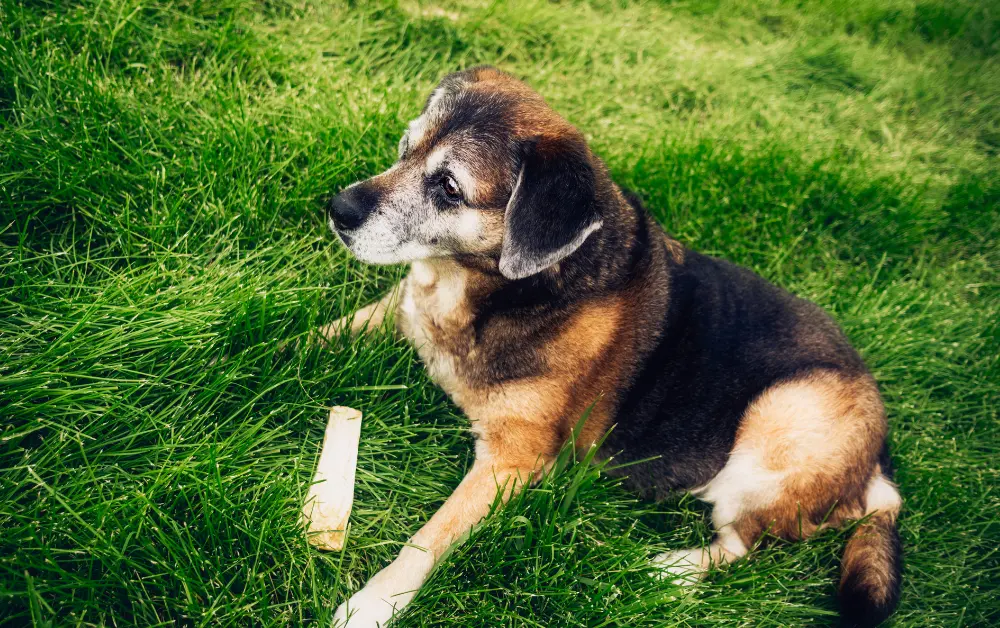
- Provide plenty of other chew toys to keep your dog occupied.
- Consider alternatives to rawhide, such as organic chew treats, bully sticks, dental chews, and Kongs filled with treats or peanut butter.
- Reduce the time your dog is left alone with the rawhide by supervising them when they chew it.
- Dogs training is key for behavioral modification. Train your furry friend to drop the rawhide on command so you can take it away if needed.
- If your dog enjoys playing with the rawhide but tends to swallow large chunks, cut it into smaller pieces before giving it to them.
- Avoid coating rawhides in sweeteners or flavors, as these can encourage your dog to swallow larger pieces.
- Offer other safe dog food: Boiled chicken or turkey, Raw fruits and vegetables, Low-sodium canned tuna or salmon, Small amounts of cheese, plain yogurt, and cooked grains, Limited amounts of peanut butter (xylitol-free)
How do I know if my dog has a blockage from rawhide?
The symptoms of intestinal blockage in dogs due to rawhides are:
- Abdominal pain or bloating
- Vomiting or diarrhea
- Loss of appetite
- Lethargy or depression
- Lack of stool production
- Abnormal behaviors, such as licking the abdomen, pacing, restlessness, and uncharacteristic vocalizations
- Increased salivation or drooling
If you observe any of these symptoms, contact your veterinarian immediately. A physical exam and diagnostic tests will help to determine if there is an obstruction from a rawhide chew and what course of treatment is necessary.
In some cases, surgery may be required.
Why do dogs chew rawhide bones?
Rawhide bones are a popular choice for many dog owners because they provide an outlet for their natural instinct to chew and offer hours of entertainment.
Chewing rawhide helps to keep teeth clean, provides mental stimulation, and can even help reduce anxiety.
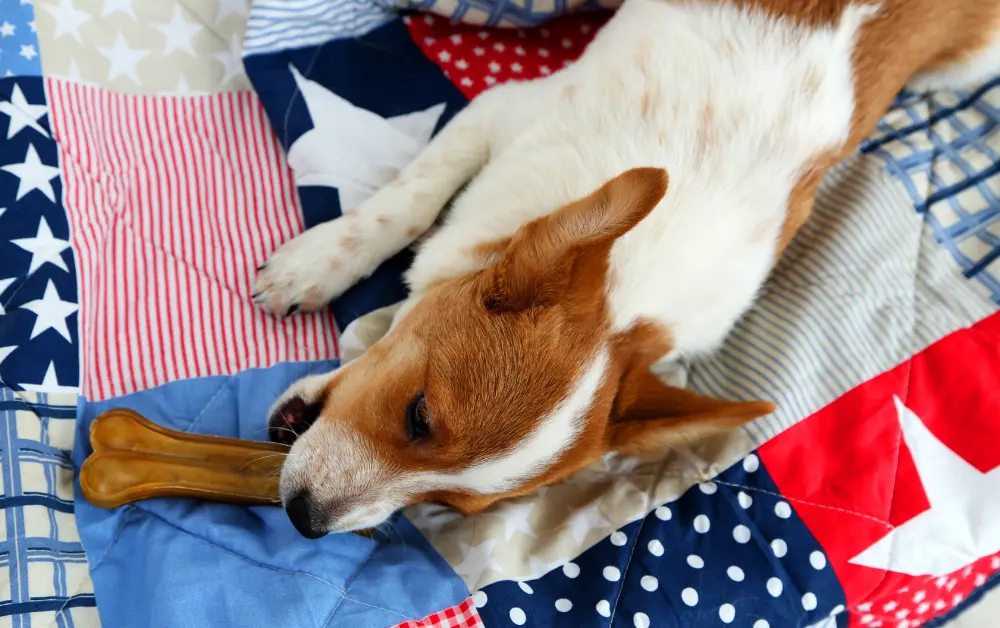
How long to soak Rawhide?
Soak rawhide for anywhere between 5 minutes to 30 hours, depending on the desired outcome and the hardness of the treat. The longer you soak it, the softer it will become.
However, it is important not to soak rawhide for too long as it can start to break down and degrade in water.
You May Also Like To Read:
FAQ:
Can I leave my dog with rawhide?
Never leave your dog unsupervised with rawhide. Rawhide can be a choking hazard and contain bacteria that could make your pet sick.
What happens if a dog eats too much rawhide?
Eating too much rawhide can lead your pup to an upset stomach, vomiting, and other gastrointestinal issues.
How long does rawhide take to break down?
Rawhide does not break down in dogs’ stomachs, but the peaches of rawhide will pass through your dog’s poo.
Does rawhide soften in a dog’s stomach?
No, rawhide does not soften in a dog’s stomach. The digestive acids in a dog’s stomach will not break down the rawhide, so that it can cause an obstruction or blockage in the digestive tract.
How many rawhide bones can a dog have in a week?
Never give more than 2 rawhide chews to your dog in a week. Giving your dog too many rawhide chews can lead to digestive issues.
Can dogs get sick from rawhide bones?
There are possibilities of dogs getting sick from rawhide bones. Rawhide can be contaminated with bacteria which, if ingested, can cause food poisoning or other illnesses.

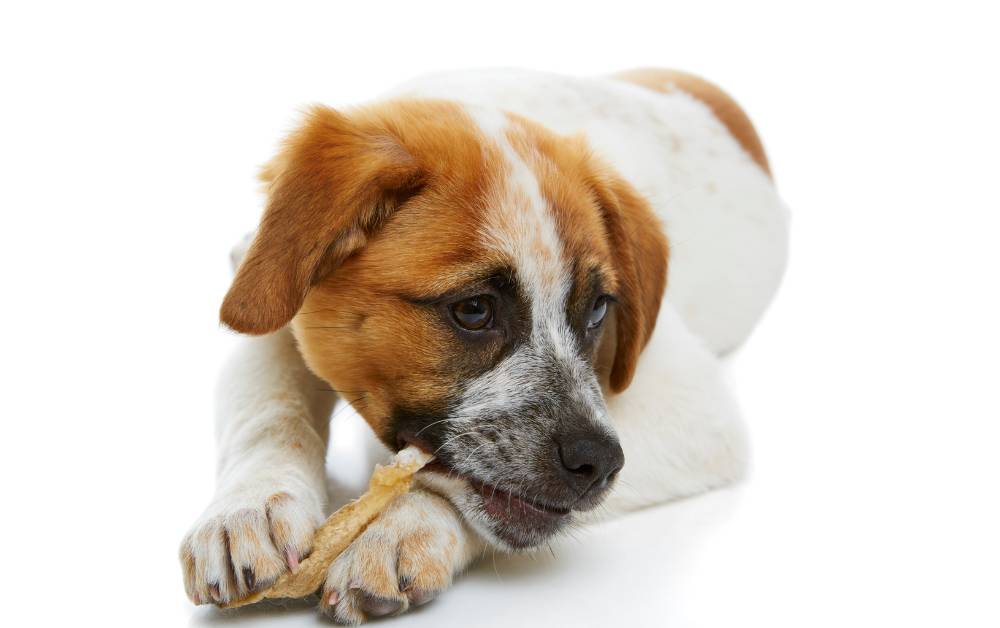

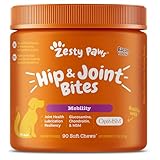






![Can Dogs Eat Blood? 7 Side Effects [Expert Opinion]](https://petskor.com/wp-content/uploads/2022/04/Webp.net-resizeimage-12.jpg)
